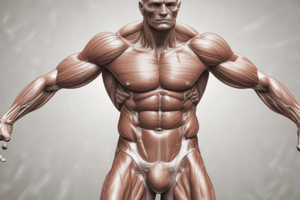Podcast
Questions and Answers
Which principle of exercise physiology suggests that gains made through training are lost when training ceases?
Which principle of exercise physiology suggests that gains made through training are lost when training ceases?
- Overload principle
- Principle of progression
- Specificity of exercise
- Reversibility of training effects (correct)
Why is rest and recovery considered essential in exercise physiology?
Why is rest and recovery considered essential in exercise physiology?
- It primarily enhances the specificity of exercise.
- It is necessary for the body to adapt and improve from the stress of physical activity. (correct)
- It prevents the body from experiencing the overload principle.
- It directly maximizes VO2 max without any training.
Which aspect of exercise physiology is directly related to understanding how the nervous system influences muscle movement?
Which aspect of exercise physiology is directly related to understanding how the nervous system influences muscle movement?
- Fueling for exercise
- Delayed Onset Muscle Soreness (DOMS)
- VO2 max testing
- Mind to muscle connection (correct)
According to the principle of specificity of exercise, which of the following training methods would be MOST effective for improving cardiovascular endurance?
According to the principle of specificity of exercise, which of the following training methods would be MOST effective for improving cardiovascular endurance?
Which of the following best describes the 'overload principle' in the context of strength training?
Which of the following best describes the 'overload principle' in the context of strength training?
How would an exercise physiologist BEST apply the ‘principle of progression’ to a client’s resistance training program?
How would an exercise physiologist BEST apply the ‘principle of progression’ to a client’s resistance training program?
If an athlete is training to improve their VO2 max, which type of training would be MOST beneficial?
If an athlete is training to improve their VO2 max, which type of training would be MOST beneficial?
In the context of exercise physiology, what is the primary factor that contributes to Delayed Onset Muscle Soreness (DOMS)?
In the context of exercise physiology, what is the primary factor that contributes to Delayed Onset Muscle Soreness (DOMS)?
Which training adaptation is MOST directly associated with an increased ability to generate ATP aerobically?
Which training adaptation is MOST directly associated with an increased ability to generate ATP aerobically?
Which of the following scenarios BEST exemplifies the principle of 'specificity of exercise'?
Which of the following scenarios BEST exemplifies the principle of 'specificity of exercise'?
Which long-term adaptation to endurance training enables an individual to exercise at a higher intensity for a longer duration?
Which long-term adaptation to endurance training enables an individual to exercise at a higher intensity for a longer duration?
Which of the following strategies would MOST effectively reduce the risk of DOMS after a strenuous workout?
Which of the following strategies would MOST effectively reduce the risk of DOMS after a strenuous workout?
An individual with a high VO2 max would typically exhibit which of the following characteristics during maximal exercise?
An individual with a high VO2 max would typically exhibit which of the following characteristics during maximal exercise?
Which strategy would be MOST effective in minimizing DOMS following a high-intensity resistance training session?
Which strategy would be MOST effective in minimizing DOMS following a high-intensity resistance training session?
Flashcards
Exercise Physiology
Exercise Physiology
The study of how the body functions during physical activity and adapts to chronic exercise.
Overload Principle
Overload Principle
To see results, the body must be challenged beyond its current capacity.
Principle of Progression
Principle of Progression
As the body adapts, the level of challenge must increase to continue seeing improvements.
Specificity of Exercise
Specificity of Exercise
Signup and view all the flashcards
Reversibility of Training Effects
Reversibility of Training Effects
Signup and view all the flashcards
DOMS
DOMS
Signup and view all the flashcards
VO2 Max
VO2 Max
Signup and view all the flashcards
Fueling for exercise
Fueling for exercise
Signup and view all the flashcards
Mind-Muscle Connection
Mind-Muscle Connection
Signup and view all the flashcards
Adaptation to Exercise
Adaptation to Exercise
Signup and view all the flashcards
Study Notes
- Exercise Physiology studies how the body functions during physical activity stress.
- It also examines how the body adapts to ongoing physical activity.
Strength Basis of Exercise Physiology
- Overload principle: The body must be challenged to see results.
- Principle of progression: As the body adapts, it must be continuously challenged to improve.
- Specificity of exercise: Only trained muscles or systems will improve.
- Rest and recovery is important for results.
- Reversibility: Training benefits are lost without continued training.
Concepts in Exercise Physiology
- Fueling for exercise involves understanding what energy systems are used during different activities like walking, running, or lifting.
- It also addresses where energy comes from and how to increase it.
- The "mind to muscle" connection explores how muscles respond to brain signals.
- The central and peripheral nervous systems are also involved.
- Muscle soreness, including DOMS (Delayed Onset Muscle Soreness), is investigated.
- Adaptation to exercise is another concept.
- Such as, how gains are made and how to train for more endurance.
- Consideration of what energy systems are active when you are walking versus running versus lifting.
- Understanding where this energy originates and methods to enhance it.
- How muscles respond to brain signals is explored.
- Reasons for its occurrence are investigated.
- What occurs in the body when gains are made is examined.
- Methods to train for enhanced endurance are considered.
Assessments
- VO2 Max Testing measures the maximal oxygen consumption.
- It indicates the amount of oxygen the body can take in, transport, and use to generate ATP.
- VO2 max is reflective of overall aerobic fitness.
- Higher VO2 max = better overall fitness
Studying That Suits You
Use AI to generate personalized quizzes and flashcards to suit your learning preferences.




